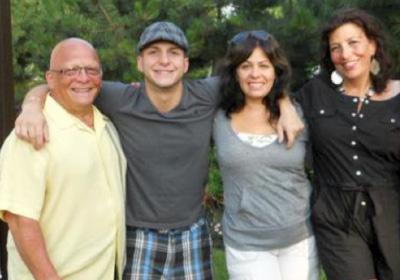
By MARI GRIGALIUNAS mgrigaliunas@shawmedia.com
ADDISON - When Louie Theodore Miceli died of a heroin overdose at 24 years old, his family vowed to change the conversation about the drug that's taken a growing number of lives in Chicago's suburbs by creating the Addison-based LTM Heroin Awareness and Support Foundation in his name.
“[People associate] heroin addicts with people in the back alley, with homeless people,” Louie's older sister, Kristen Gutierrez said of the misconceptions people have about heroin addicts.
“That era is over,” she said. “It's football players. It's cheerleaders. It's the kid next door. My brother was the kid next door.”
After spending five minutes with the Miceli family's jokes and warm smiles, Gutierrez' words come to life.
“He wasn't a troubled kid at all,” said his father, Lou Miceli.
Louie Miceli's favorite day was Sunday, his family said, because he loved family dinner at his parents' home in Medinah. He played football on state championship teams at Driscoll Catholic High School, had no shortage of friends and attended Benedictine University. His father said more than 3,000 people attended his wake in August 2012 at Salerno's Rosedale Chapels in Roselle.
The foundation launched its first event at the beginning of June at Stardust Bowl in Addison. About 120 merchants donated prizes to be raffled off or bought through a silent auction.
“We don't have our [nonprofit] designation yet,” Gutierrez said. “So they just did it with nothing in return.”
Since beginning the foundation less than a year ago, the Miceli family said they meet people all the time who knew someone who died using heroin, but no one seems to want to talk about it. Gutierrez recalled a woman who lowered her voice and whispered the word “heroin” to her in a recent conversation.
Louie's mother, Felicia Miceli, knows firsthand how difficult it is to talk about her son's addiction to heroin.
“I'm sure people believe that it reflects on our parenting skills,” she said. “It's sometimes hard.”
Kristen Gutierrez thinks that stigma is the biggest obstacle to spreading awareness and educating young people about the risks of trying heroin. One goal of the LTM Foundation is to reform the blanket approach to drug education.
Not that we're condoning other kinds of recreational drugs,” said Gutierrez, who thinks placing marijuana and heroin into the same overarching category titled “drugs” doesn't save lives.
According to DuPage County Coroner statistics, Louie Miceli was one of 43 heroin victims in the county last year. As of June 11, 16 people died in the county as a direct result of heroin use this year.
“I know my brother, Lou,” Kristen Gutierrez said. “If he would have known the person it made him, I know that he would not have touched it.”
Louie, like many people his age, would drink with his friends on the weekends. Gutierrez remembers him telling her he also smoked marijuana, but that was it. When his brother, Vinny, underwent surgery for a sports injury, the two began experimenting with the leftover pain killers. Then, Louie Miceli tried heroin at a party, probably not even realizing what it was in powder form, his family said.
“You don't casually use heroin,” Gutierrez said. “You use heroin to become an addict, if not the first time, definitely by the second or third.”
For Louie Miceli, it just took that one time, even with two stints in rehabs, finding a connection with Jesus Christ and his family's constant support. His family created the LTM Foundation with the goal of saving others like his 23-year-old brother, Vinny Miceli, who will be clean one year in August.
“If we could spare someone from this devastation, from this pain, it's worth it,” Felicia Miceli said.
Lou Miceli, who owns Miceli's Deli in Chicago, says he tells everyone at his store about his late son and his battle with heroin.
“I'm not ashamed of it,” Lou Miceli said. “It was a disease; it wasn't him.”


